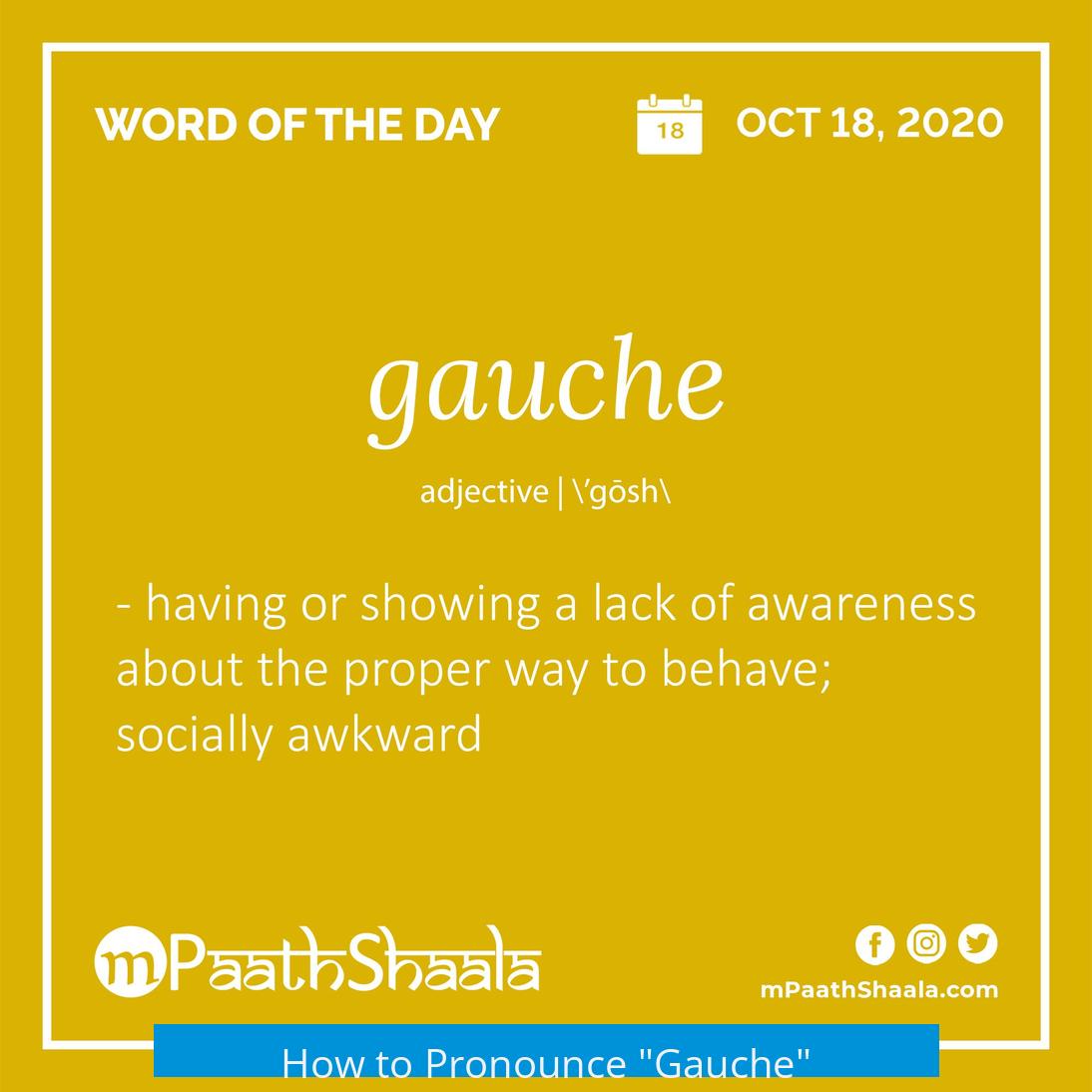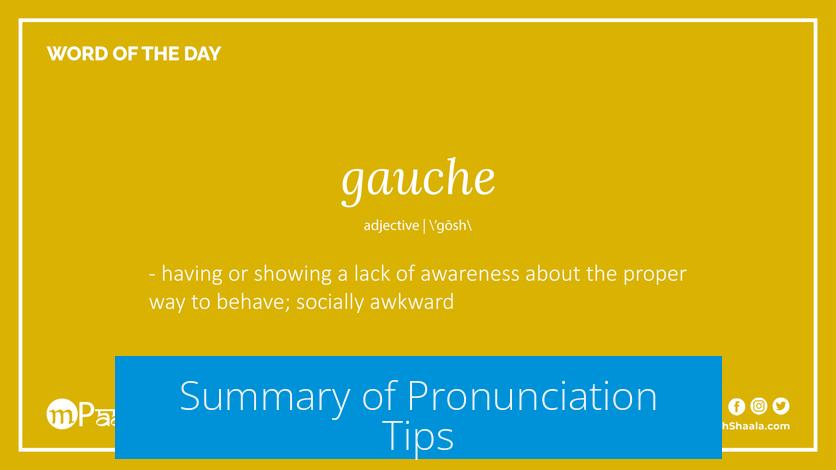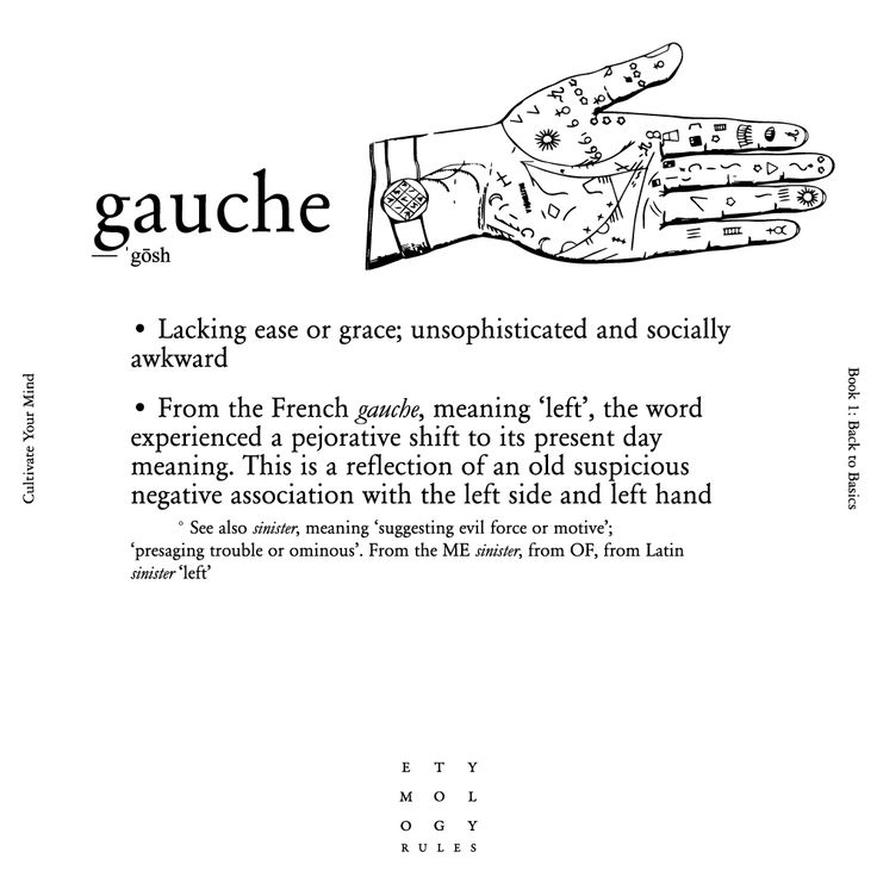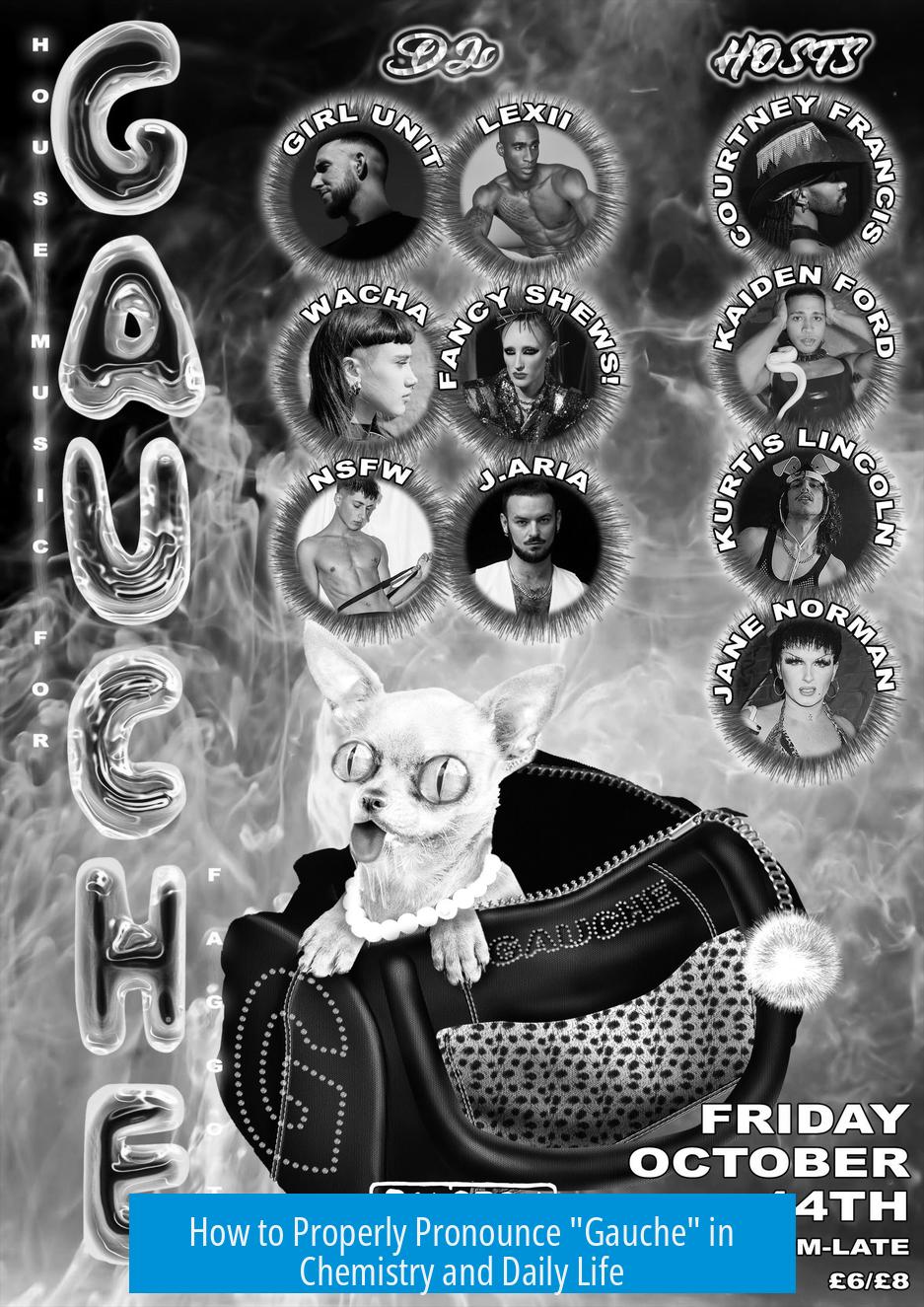How to Pronounce “Gauche”

The word “gauche” is pronounced as /ɡoʊʃ/, which sounds like “gohsh.” The first syllable “Gau-” rhymes with “cow,” and the ending “-che” is pronounced like the “ch” in “couch.”
Phonetic Breakdown
- Gau-
- -che
The combination forms the smooth, two-syllable “gohsh” sound, matching its French origin. The pronunciation differs from how English speakers might guess by sight.
Context of Use in Chemistry
The term “gauche” is common in organic chemistry discussions, especially in molecular conformations. It describes a specific spatial arrangement of atoms in molecules.
Most undergraduates encounter “gauche” during their first semester. Understanding its pronunciation can aid clearer communication in academic settings.
Language Background and Cultural Notes
“Gauche” is borrowed from French. A background in French helps with correct pronunciation. In English, the word may be mispronounced without this knowledge.
A student noted that a French degree might be more helpful than a chemistry degree for mastering the pronunciation. This shows the blend of language and science involved.
One learner mentioned studying alongside a dictionary author, emphasizing credibility in pronunciation claims.
Summary of Pronunciation Tips

| Part | Pronunciation | Example |
|---|---|---|
| Gau- | /ɡoʊ/ | Rhymes with “cow” |
| -che | /ʃ/ | As “sh” in “couch” |
Key Takeaways
- “Gauche” is pronounced “gohsh” (/ɡoʊʃ/).
- The first part rhymes with “cow,” and the ending sounds like “sh” in “couch.”
- It is commonly used in organic chemistry to describe molecular conformations.
- French language knowledge aids correct pronunciation.
TIL How to Pronounce “Gauche”: Your New Favorite Organic Chemistry Word
Ever stumbled over the word gauche in organic chemistry class and wondered if you’re supposed to rhyme it with “coach” or say it like “gosh”? You’re not alone. Today, we’re diving into the correct way to pronounce gauche — and trust me, it’s simpler than it looks.
The Straight-Up Answer on Pronunciation
“Gauche” is pronounced as gau rhyming with “cow” plus che sounding like the “ch” in “couch.” Yes, it’s two syllables—”gau-ch.” Think about it: the “gau” part steps confidently with that “ow” sound, while the “che” taps lightly at the end, like a soft “ch.” So it’s roughly “gowsh”, but holding onto that gentle “ch” sound rather than the hard “sh” you might be tempted to use.
Sounds odd? French origin warns us—pronunciations aren’t always intuitive! Consider French’s tendency to be elegant even when awkward for English speakers. While “gauche” literally means “left” or “awkward” in French, it also refers to a certain molecular conformation in organic chemistry.
Where You’ll Hear It: The Chemistry Classroom

This word isn’t just fancy jargon. If you’re an undergraduate tackling your first semester of organic chemistry, gauche becomes part of your everyday dialogue. It describes a specific spatial arrangement in molecules—one that isn’t quite “anti” but rather molecules hanging out at a closer angle, often creating subtle effects on their behavior. The gauche conformation pops up in everything from simple hydrocarbons to complex sugars and drugs.
When someone discusses a “gauche interaction,” what they really mean is a particular way atoms align that can sometimes invite steric hindrance or influence reactivity subtly. So, yes, knowing how to pronounce it matters, especially if you want to sound like you belong in the chemistry crowd rather than like you’re making it all up!
French Degree for Pronunciation? Maybe!
Here’s a funny tidbit: if you’ve ever wished your chemistry degree had a French language minor attached, you’re not alone. Organic chem with its loanwords from French—like “gauche,” “eclipse,” and even “aromatic”—can stump students trying to nail the pronunciation.
“A French degree would have helped you a lot more than a chemistry degree on this one :p” is a common sentiment among undergrads facing this term for the first time. The French connection explains why “gauche” sounds so classy but manages to trip so many tongues.
One charming anecdote: an English student at the same college as the dictionary author shares, “I’m English and study at the same college as the man who wrote the dictionary, so I have some credibility.” So, if you’re aiming for spot-on pronunciation, channel your inner French scholar or trust the word’s phonetic clues.
Practical Tips to Nail the Pronunciation
- Break Down the Word: Split it into two parts—“gau” (rhymes with “cow”) and “che” (like the “ch” in “couch”).
- Practice Out Loud: Say “cow” then follow it quickly with “ch” from “couch.” Repeat until it’s smooth.
- Mind the Accent: Avoid turning “che” into a hard “sh” sound. It’s a delicate “ch” with a slight breathiness.
- Flashcard Fun: Write “gauche” and beside it, a phonetic clue like “cow-ch.” Place it near your study desk.
- Ask a Friend: Say the word and have your chemistry-savvy friend listen. Getting feedback helps avoid fossilizing a mispronunciation.
Why Pronouncing It Right Matters More Than You Think
Pronouncing technical terms correctly isn’t just about sounding smart. It helps you understand and retain the concept. When you say “gauche” right, you engage your brain more deeply with the material. It sets you apart in lectures and discussions. And hey, it’s a confidence booster. Imagine casually dropping the term and hearing peers whisper, “Wait, you actually knew how to say ‘gauche’?” Instant street cred.
More than that, it’s about clarity. Mispronouncing terms in science can cause misunderstandings. One wrong sound, and you might be talking about a completely different concept. In a field that demands precision, getting the words right is half the battle.
Going Beyond Chemistry: “Gauche” in Daily Life

Fun fact: outside labs, “gauche” describes awkwardness or lack of social grace—the word’s original French meaning. So next time you fumble an introduction or trip on a sidewalk, just say, “That was a perfectly gauche moment,” and you’re sounding sophisticated, even if a bit self-deprecating.
Language lovers and chemistry buffs alike will appreciate this neat double life. Pronounce it correctly, and you straddle two worlds—the sharp scientific and the elegant linguistic—with ease.
Wrapping It Up: From Mystery to Mastery
So, to summarize: “gauche” is pronounced like “gau” rhyming with “cow” plus “che” like in “couch,” perfectly capturing the French flair and chemistry precision. If you’re an organic chemistry newbie, embrace this term early. It’s not just jargon; it’s a ticket to speaking the language of molecules fluently.
Learning the pronunciation also connects you to the history of science language and the quirky quirks of French influence. And hey, when you walk into that lecture hall or discussion group, you’ll drop this word like a pro—making others wonder how you got so cool, so fast.
Ready to practice? Say it with me now: gau-che. Easy, right? You just leveled up in both language and science. What’s the next tricky word you want to conquer?
How do you pronounce “gauche” correctly?
Pronounce “gauche” by saying “gau-” like “cow” and “-che” like the “ch” in “couch.”
Where do most people learn the term “gauche”?
Most undergraduates learn “gauche” during their first semester in organic chemistry. It relates to molecular conformations.
Does knowing French help in pronouncing “gauche”?
Yes. Since “gauche” is French, a French degree would help more with pronunciation than a chemistry degree.
Is the pronunciation influenced by English usage?
Some English speakers use the French pronunciation, but pronunciation can vary. Studying with experts, such as those involved in dictionaries, adds credibility.





Leave a Comment